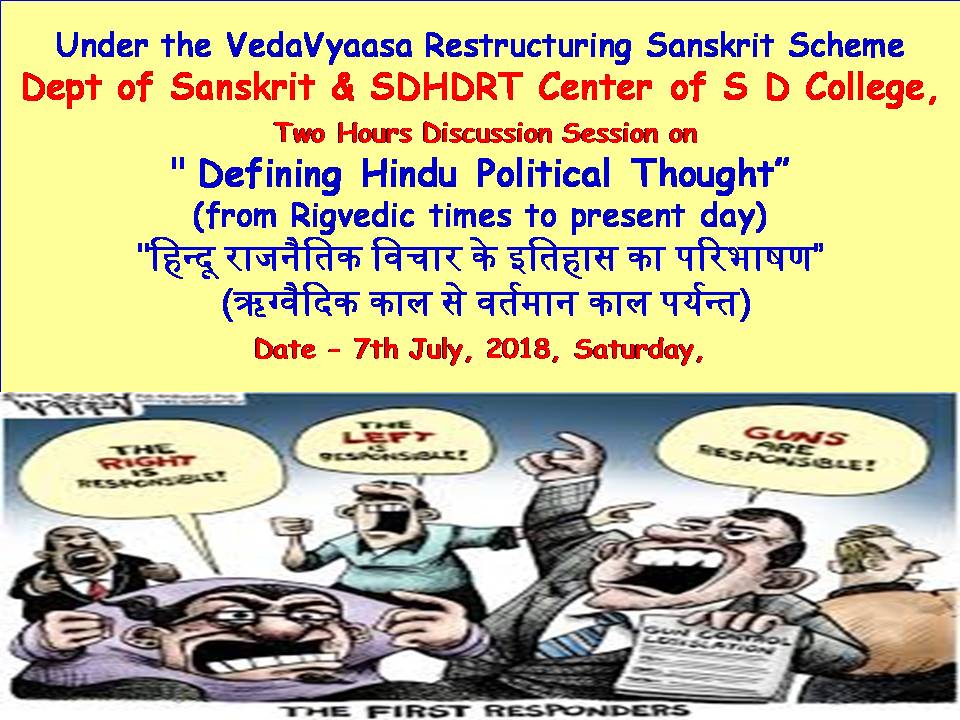
GIST OF DISCUSSION
Under the VedaVyaasa Restructuring Sanskrit Scheme of Dept of Skt & SDHDRT Center of S D College, A/ Cantt, a discussion session on the topic- “Definining Hindu Political Thought (from Rigvedic times to present day)”हिन्दू राजनैतिक विचार के इतिहास का परिभाषण (ऋग्वैदिक काल से वर्तमान काल पर्यन्त) was attended by Dr S P Sharma, Dr ViJay Sharma, Dr. Uma Sharma, Dr Jaiprakash, Dr Shyam Nath Jha, Sh. B D Thaper, Sh. Anil Mittal, 7students After initial introduction to the Western (Greek/Roman/European) political thought which emerged out of struggle between state, state representatives vs masses which were acknowledged as people after a long long history of violence. (For most of the poilitical scientists there may not be any difference between the two terms masses & people. But for Sanskritists there is a basic difference when they’re translated as जन & लोक because Jan is survival oriented term and loka is defined by culture of enquiry or questioning.) All Western political thought is the manifestation of violence or survival and later on wars brought in many terms/ concepts related to human dignity which are known as freedom, democracy, human rights and many more terms like these. But at the same time Hindu Political thought can not be defined in terms of Western narratives because of the reason that the situations in Bharat were never the same as they were in West. For any Sanskritist राजा is not king as he is accountable to his subjects without discrimination etc, प्रजा is not masses as these are cultured people, like wise राज्य राष्ट्र, स्वतंत्रता, न्याय, अधिकार they have different meaning and ethos. (yes social scientists who are trained & conditioned to think of India only in terms of caste, blind faiths etc, they are free to have their beliefs). So streams of matured political thinking can be seen right from Rigvedic literature to Puranas to other literature including Jain Baudha till 8th-9th century. Till that time all state power related ideas and treatment of Raajaas with their own praajaa can been seen in many Sanskrit texts. Later on with Muslim invasion Hindu Political thought started emerging slowly in the the form of स्वाधीनता and countering Muslim power. And slowly came Britishers who brought in new born ideologies with business interests. They were successful in confusing the Indian mindset by their political terms along with looting practices. And then emerged two classes of Indian political thinkers one class consisted of Tilak, Gandhi, Savarkar, Bankim Chandra etc. Who propunded RaamRajya idea, Swarajya , Bharatmata, hinduhood and second class consisted of Nehru etc who borrowed terms of development, socialism, etc. All discussed ideas can not be explained here but succintly Hindu Political thought can be putting forth in one shloka and one Dohaa and thus as sanskritists we feel that we can challenge communist, secular thoughts on our ground and in our own terms.
१ “व्यवस्थितार्यमर्याद: कृतवर्णाश्रमस्थिति:। त्रैय्या हि रक्षितो लोक: प्रसीदति न सीदति।।
२ राम राजा राम प्रजा राम साहूकार है। बसे नगरी जिए दाता धर्म परोपकार है।।
In the end it was decided to organize a seminar on this very issue and political scientists along with sanskritists be invited to have a positive dialogue.
(This brief has many short comings but Dept of Sanskrit has sincerely tried put together the ideas as discussed)
Regards
Ashutosh Angiras
